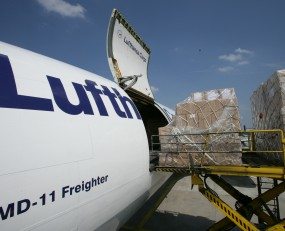
Lufthansa Cargo reflected a general deceleration in the air freight market in its results for 2018. The company’s CEO, Peter Gerber, struck a note of caution for the future, commenting that “the current year, unlike 2018, is again characterized by the weakness typical of the logistics market in the early months of the year. Given low global economic growth, this is currently being exacerbated by reports of Brexit and trade disputes.”
Despite Lufthansa’s claims of near record results, the annual numbers published on Monday show a muted performance in 2018. Revenue was up 7% over 2018 however EBIT (Earnings Before Interest and Tax) was flat at €2.713bn, although the company quotes an Adjusted EBITDA (Earnings Before Interest, Tax and Amortisation) figure that grew by 2%.
The tonnage of goods carried measured in ‘revenue per tonne kilometres’ rose by 1% but the airline’s cargo capacity was up by 5% as it continued to renew its fleet. This probably represents a slight loss of market share with demand for cargo at roughly 3.5% over the past twelve months, although demand fell sharply towards the end of the year.
Lufthansa Cargo continues to invest heavily in additional capacity, both in aircraft such as the Boeing 777- although it is also dispensing with older aircraft- and new hub facilities at Frankfurt. The company appears confident that it can fill this additional capacity despite market conditions.
Overall the results were not unexpected but still slightly disappointing in that Lufthansa was not able to make more of the growth that was available in the market. As Peter Gerber himself pointed out, it is e-commerce that is the dynamic part of the air freight market and Lufthansa is connected to this sub-sector through its AeroLogic joint venture with DHL Express, with the latter seeing double-digit percentage growth in its demand. This might suggest that Lufthansa Cargo’s varying growth has as much to do with positioning within the market than the overall expansion of air freight demand. However, this could be said of much of the conventional air freight sector that appears to adapted too slowly to the economy of the 21st century.
Source: Transport Intelligence, March 19, 2019
Author: Thomas Cullen